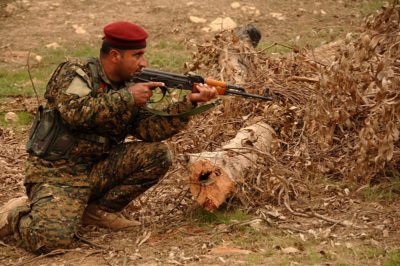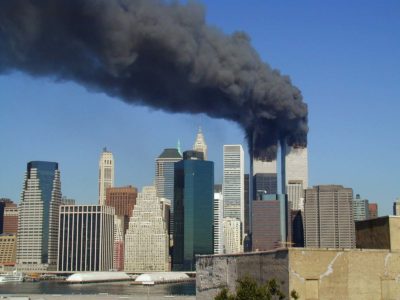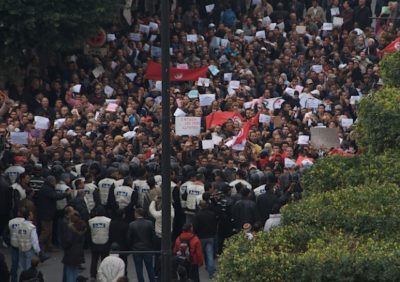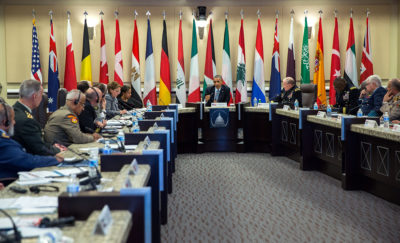A nation must think before it acts.
From the Archives
The Inevitability of Lone-Wolf Attacks by the Islamic State
June 2017

The Challenge of Political Unity in Post-ISIS Iraq
June 2017

Syrian Expectations of the United States
June 2017

What have we learned since 9/11?
September 2016

Nearly fifteen years after 9/11, the United States is still entangled in an ongoing battle against extremist terrorism. Though our opponent has changed in strategy and name, the core of the conflict has remained unchanged. Despite this relative consistency, professors and students alike remain dishearteningly naive about the region of the world that has engulfed United States foreign policy for over a decade.
Knowledge about the Middle East has not grown much in the nearly fifteen years since 9/11, despite the fact that citizens have the information at their fingertips. In his 2011 essay What Our Students – and Our Political Leaders – Don’t Know About the Middle East, Adam Garfinkle elaborates on the American tendency to either paint the Middle East with a broad brush or to ignore the region altogether, as well as the necessary steps to being able to understand the region in the wake of terror attacks both in and out of the Middle East.
Reform over Engagement
March 2016

Omar Said Ghobash, the UAE ambassador to Russia, explains what this reform could look like and why it is both difficult and absolutely vital. In his September 2014 essay Winning the War of Ideas in the Arab World: A View from the UAE, he analyzes the weak points of extremist ideology and how pragmatism and religious faith can help defeat ISIS.
Syria: How did we get here?
February 2016

Many pundits have wondered how the West, particularly the United States, allowed the situation in Syria to escalate so catastrophically. In his June 2012 essay, How Washington Lost Syria, FPRI contributor Gary C. Gambill described the origins of the conflict, detailed the missed opportunities that might have avoided bloodshed, and prophetically explained why a negotiated settlement is so elusive.
Jordan’s Role in the Syrian Conflict
February 2016

In the past month, Saudi Arabia, the United Arab Emirates, and Turkey have all signaled a degree of support for ground operations in Syria, nominally to combat the Islamic State. This would represent a risky escalation and the further internationalization of the conflict, though it might also finally bring the war to a close and destroy the threat of ISIS. The Kingdom of Jordan will be the linchpin of these efforts to cobble together a ground coalition due to its strategic location on Syria’s southern border.
Jordan’s King Abdullah now faces a series of critical junctures, each more treacherous than the next. Director of FPRI’s Middle East Program, Tally Helfont, described the King’s options and how Jordanians have approached the Syrian crisis in the past in her July 2012 essay, Jordan’s Quandary Over Syria.
Progress on North African’s Democratic Prospects?
December 2014

Military Action & Countering Militant Ideology
September 2014

The Obama administration recently announced the creation of a coalition comprised of both Western and Middle Eastern countries to combat the Islamic State. This decision was largely driven by the organization’s recent military victories and territorial acquisitions, along with their dangerously radical view of Islam. Although airstrikes and the arming of opposition groups may be effective in combating ISIS in the short term, is a purely military strategy truly effective in the long term? Is there a more efficient, and less costly, way of combating radical Islamists?
In his November 2013 essay, Competing Visions of Islam: From Osama bin Laden to Morocco’s King Mohammed VI, FPRI’s President Alan Luxenberg discusses the contention between moderate and radical views of Islam. He asserts that the propagation of more liberal visions of Islam by key religious and political leaders, such as King Mohammed VI, can help stem the growth of jihadism throughout the region.
ISIL and Sectarianism
August 2014

Conflict and Collateral Damage – The Moral Dimension
July 2014

Afghanistan’s Stability after the American Exit
June 2014
 Although the U.S. and the international community have helped make Afghanistan a more secure country over the past decade, there is a great deal of concern in Washington that the government of this conflict-prone nation will be unable to maintain stability following the withdrawal of U.S. troops. With the recent release of five senior Taliban leaders from Guantanamo Bay, U.S. critics ponder the likelihood of terrorist reengagement in Afghanistan. It is only fitting, therefore that we take a look back at the April 2013 article by Andrew Garfield and Alicia Boyd on “Understanding Afghan Insurgents: Motivations, Goals, and the Reconciliation and Reintegration Process” which gives us a more comprehensive understanding of what Taliban insurgents seek to accomplish.
Although the U.S. and the international community have helped make Afghanistan a more secure country over the past decade, there is a great deal of concern in Washington that the government of this conflict-prone nation will be unable to maintain stability following the withdrawal of U.S. troops. With the recent release of five senior Taliban leaders from Guantanamo Bay, U.S. critics ponder the likelihood of terrorist reengagement in Afghanistan. It is only fitting, therefore that we take a look back at the April 2013 article by Andrew Garfield and Alicia Boyd on “Understanding Afghan Insurgents: Motivations, Goals, and the Reconciliation and Reintegration Process” which gives us a more comprehensive understanding of what Taliban insurgents seek to accomplish.
Arming the Syrian Opposition?
May 2014
President Obama’s address to West Point’s graduating Class of 2014 received a decidedly mixed response. The speech was simultaneously hailed as a much needed reset of a largely ineffective foreign policy and derided as an empty preservation of the status quo. One of the most noteworthy components of the speech dealt with Syria, though in a decidedly cryptic manner in which the President announced his desire to “help those who fight” in the conflict. For some, this was viewed as the long-awaited decision to militarily aid moderate forces against Bashar al-Assad regime. Gary C. Gambill in his article, Arms for Peace in Syria?, discusses the logic behind the arming the rebels—revealing that the President’s motivations may be different from what most think. Read more here.
Tukey and Iran: Friends or Foes?
December 2013
 For some time, Middle East observers have been curious about the ebb and flow of the Turkish-Iranian relationship. Rapprochement has been succeeded by animosity, which in turn has been succeeded by olive branches, and then further misunderstandings. Mutual interests, and mutual competition for that matter, between the two countries go beyond bilateral relations, bleeding over into many of the regional conflicts taking place throughout the region. Whereas the two countries saw eye to eye on Gaza, as seen through the Mavi Marmara incident, they have often diverged on Syria. Gallia Lindenstrauss and Yoel Guzansky looked at the evolving Turkish-Iranian relationship in April 2011, in their aptly titled Middle East Media Monitor article, The Rise and (Future) Fall of a Turkish-Iranian Axis. To access the full article, click here.
For some time, Middle East observers have been curious about the ebb and flow of the Turkish-Iranian relationship. Rapprochement has been succeeded by animosity, which in turn has been succeeded by olive branches, and then further misunderstandings. Mutual interests, and mutual competition for that matter, between the two countries go beyond bilateral relations, bleeding over into many of the regional conflicts taking place throughout the region. Whereas the two countries saw eye to eye on Gaza, as seen through the Mavi Marmara incident, they have often diverged on Syria. Gallia Lindenstrauss and Yoel Guzansky looked at the evolving Turkish-Iranian relationship in April 2011, in their aptly titled Middle East Media Monitor article, The Rise and (Future) Fall of a Turkish-Iranian Axis. To access the full article, click here.
Where is Egypt Headed?
August 2013
Egypt, having been our primary ally in the region for several decades, is now on uncertain footing vis-à-vis the United States. The country has devolved into barely bridled chaos, with renewed protest, threatening what little stability it has achieved in recent weeks and months. Questions about governance, the viability of democracy, and minority rights are but a few of the issues currently plaguing the country, its citizen, and even its allies. Many now find themselves wondering, where is Egypt headed?
Ambassador Daniel C. Kurtzer asked this same question, Where is Egypt Headed?, in November 2008, discussing what was, at that time, the most pressing and uncertain issue in Egypt: the succession. Of course we now know that Mubarak did not pass on the presidency to his son Gamal, and yet this essay by Ambassador Kurtzer still provides several prescient analysis points that warrant a second look. He argues, for example, that “In many respects, the U.S.-Egypt dialogue on democratization is really a “duologue” of two independent monologues, stemming from two very different political cultures, in which neither side is clearly listening to the other.” Likewise, Kurtzer suggests that “it would be wise for Egyptians to undertake their own internal assessment of the value of political liberalization, not one choreographed or coming under pressure from the outside.” To read the article, in its entirety, click here.
Time to Rethink American Foreign Policy in the Middle East?
August 2013
While many in Washington policy circles are currently considering this very question, it seems appropriate to take another look at Walter McDougall‘s iconic July 2009 essay on U.S. Foreign Policy Traditions and the Middle East. Here is a teaser: “…It is my assigned task to provide the overarching context of American foreign relations in the twentieth and twenty-first centuries. My most telling message is that the strategies and methodologies—the ends and means of America as a world power—were all contrived to surmount crises and challenges elsewhere in the world. They had no initial relevance to Islamic cultures or Middle East geography, but had somehow to be applied to Middle Eastern policies once they had pushed themselves onto the American foreign policy agenda. That is why I shall have nothing more to say on the Middle East until the very end.” The article, in its entirety, can be accessed here.



